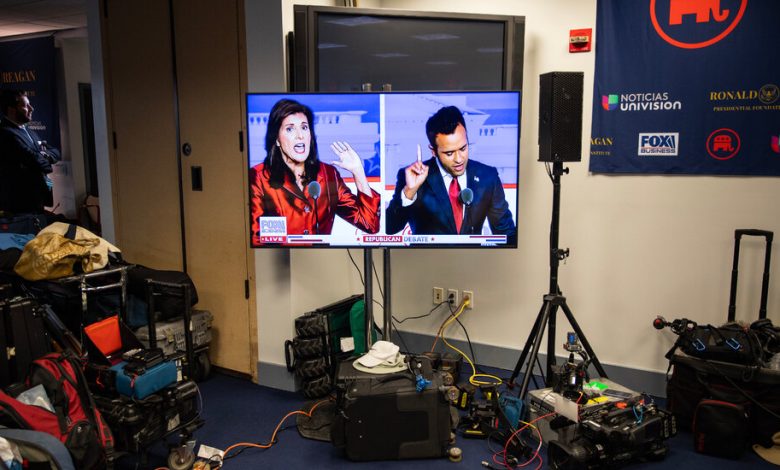Trump’s G.O.P. Rivals Must Unite or Die. (They’ll Probably Still Die.)

I’m not sure that an assembly of presidential candidates have ever given off stronger loser vibes, if I may use a word favored by the 45th president of the United States, than the Republicans who debated at the Ronald Reagan Presidential Library this week.
A snap 538/Washington Post/Ipsos poll and a CNN focus group both showed Ron DeSantis as the night’s winner, and that seems right: After months of campaigning and two debates, DeSantis is still the only candidate not named Donald Trump who has a clear argument for why he should be president and a record that fits his party’s trajectory and mood.
On the stage with his putative rivals, that makes him the one-eyed man in the kingdom of the blind. Against Trump himself, that’s probably going to be good for an extremely distant second place.
The path that I (and others) once saw for the Florida governor, where he would run on his political success and voters would drift his way out of weariness with Trump’s destructive impact on Republican fortunes, has been closed off — by DeSantis’s own struggles, the rallying effect of Trump’s indictments, and now by Trump’s solid general-election poll numbers against Joe Biden. The path other pundits claimed to see for non-Trump candidates, where they were supposed to run directly against Trump and call him out as a threat to the Republic, was never a realistic one for anything but a protest candidate, as Chris Christie is currently demonstrating.
So what remains for Trump’s rivals besides loserdom? Only this: They can refuse to simply replay 2016, refuse the pathetic distinction of claiming “momentum” from finishing third in early primaries, and figure out a way to join their powers against Trump.
This is not a path to likely victory. Trump is much stronger than eight years ago, when the crowded battle for second and third place in New Hampshire and South Carolina helped him build unstoppable momentum and the idea of a Ted Cruz-Marco Rubio unity ticket was pondered but never actually achieved. He’s also much stronger than Bernie Sanders four years ago, when Pete Buttigieg and Amy Klobuchar traded the ego-inflating satisfactions of delegate accumulations for a place on Joe Biden’s bandwagon.
But unity has been the road not taken for anti-Trump Republicans thus far, and it feels like the only scenario where this race stays remotely interesting after the Iowa results.
One problem, of course, is that unity still requires a standard-bearer — it would have been Cruz first and Rubio second in 2016, for instance, which is probably one reason Rubio didn’t make the deal — and DeSantis’s edge over his rivals isn’t wide enough for them to feel like they need to defer to him.
Another problem, central to Trump’s resilience, is that the different non-Trump voters want very different things. Some want DeSantis’s attempts to execute populist ambitions more effectively, or the novel spin on Trumpism contained in Vivek Ramaswamy’s performance art. Others want the promise of a George W. Bush restoration offered by Nikki Haley and Tim Scott, others still want the Never Trump absolutism of Christie. Would Ramaswamy’s voters go for Scott and Haley? Doubtful. Would Scott or Christie’s voters accept DeSantis? Probably, but he hasn’t made the sale.
Meanwhile, despite Trump’s claim that he won’t pick anyone who’s run against him as his vice president, he’s been known to change his mind — and that reality influences the ambitions of Ramaswamy (who at least hopes for a Buttigieg-style cabinet spot), Scott (who seems like he’s been running to be V.P. from the start) and even Haley. So too does the possibility that a conviction before the Republican convention somehow prevents his coronation, creating theoretical incentives for delegate accumulation, however remote the odds.
All of these incentives are probably enough to prevent real consolidation. But if the non-Trump Republicans were serious enough about their larger cause, they would be planning now for the morning after Iowa. If Haley or (less plausibly) Scott comes in second and DeSantis falls to third, the Florida governor should drop out and endorse the winner. If DeSantis wins but Haley is leading in New Hampshire, then he should offer a place on his ticket, and she should accept. Christie should then obviously drop out pre-New Hampshire and endorse the Iowa winner as well. (Ramaswamy, I assume, would eventually endorse Trump.)
Since this maneuvering could still just lead to Trump winning primaries by “only” 60-40 instead of 52-21-14-7-6, a final impediment to consolidation is just the fear of looking a little bit ridiculous — like Cruz and Carly Fiorina campaigning as supposed running mates in the waning moments of the 2016 primary.
And that, too, is also part of how Trump has always steamrollered his Republican opponents. They tend to hesitate, Prufrock-like, on the brink of boldness, while he rolls the dice without a single qualm or doubt.
The Times is committed to publishing a diversity of letters to the editor. We’d like to hear what you think about this or any of our articles. Here are some tips. And here’s our email: [email protected].
Follow The New York Times Opinion section on Facebook, Twitter (@NYTOpinion) and Instagram.




